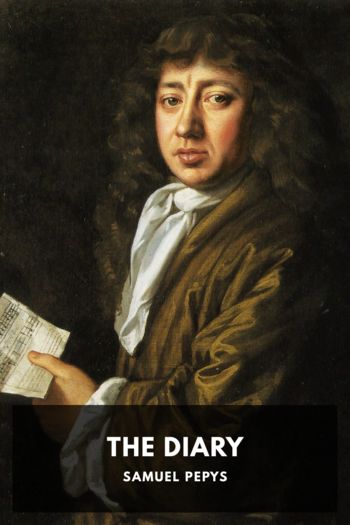The Diary - Samuel Pepys (red white and royal blue hardcover txt) 📗

- Author: Samuel Pepys
Book online «The Diary - Samuel Pepys (red white and royal blue hardcover txt) 📗». Author Samuel Pepys
Philip Herbert, fifth Earl of Pembroke, and second Earl of Montgomery. Died December 11th, 1669. ↩
Mr. Julian Marshall quotes this passage in illustration of the necessity for keeping a good temper during the game of tennis and the difficulty of doing so (Annals of Tennis, p. 205). ↩
Four were executed on May 9th, namely, Thomas Limmerick, Edward Cotton, Peter Massenger, and Richard Beasley. They were drawn, hanged, and quartered at Tyburn, and two of their heads fixed upon London Bridge (The London Gazette, No. 259). See The Trials of Such Persons as Under the Notion of London Apprentices Were Tumultuously Assembled in Moore Fields, Under Colour of Pulling Down Bawdyhouses, 4to., London, 1668. “It is to be observed,” says The London Gazette, “to the just vindication of the City, that none of the persons apprehended upon the said tumult were found to be apprentices, as was given out, but some idle persons, many of them nursed in the late Rebellion, too readily embracing any opportunity of making their own advantages to the disturbance of the peace, and injury of others.” ↩
Elizabeth, daughter of Sir Anthony Irby. —B. ↩
“The Poor Whores’ Petition to the most splendid, illustrious, serene and eminent Lady of Pleasure the Countess of Castlemayne, etc., signed by us, Madam Cresswell and Damaris Page, this present 25th day of March, 1668.” This sham petition occasioned a pretended answer, entitled, “The Gracious Answer of the Most Illustrious Lady of Pleasure, the Countess of Castlem … to the Poor Whores’ Petition.” It is signed, “Given at our Closset, in King Street, Westminster, die Veneris, April 24, 1668. Castlem. …” Compare Evelyn, April 2nd, 1668. ↩
Lady Carnegy. See March 19th, 1664–65. ↩
The disgusting story of Lord Carnegy’s (Earl of Southesk) revenge is also told in the Grammont Memoirs, chap. viii. ↩
A comedy by the Hon. James Howard. See December 8th, 1666. ↩
He died the same day, April 7th. ↩
Frances Davenport, the eldest sister of Elizabeth Davenport, the famous Roxalana. In previous editions the name has been printed incorrectly as Davenant. ↩
Charles Hart (see note 3602). This name has been printed in previous editions as Hall. ↩
A tragedy by Sir W. Davenant. ↩
The recorder was a reed instrument, but on the side near the mouthpiece there was a hole covered with a piece of bladder, which modified the quality of the sound. ↩
Afterwards Sir John Holmes, Governor of Usk Castle. His grandson, Thomas, was created Lord Holmes of Kilmallock. ↩
Margaret, sister of Anthony Lowther, who had married Margaret Penn. The marriage licence of John Holmes, of St. Martin’s-in-the-Fields, bachelor, about 28, and Margaret Lowther of the same, spinster, aged 20, is dated April 6th, 1668 (Chester’s London Marriage Licences, ed. Foster, 1887, col. 702). ↩
Paulina, lately married to Mr. Jackson. ↩
See note 3954. ↩
Davenant’s house adjoined the theatre. ↩
Henry Brouncker. ↩
The proceedings against Harman will be found in the Journals of the House of Commons, April 17th, 1668. —B. ↩
The entries from April 10th to April 19th are transcribed from three leaves (six pages) of rough notes, which are inserted in the MS. Eight pages are left blank for the insertion of the amplified Diary; but apparently Pepys never found time to write up the missing entries, and therefore inserted the rough notes when he came to bind the Diary. These notes are interesting as showing how the journals were compiled. It will be seen that the rough notes were made to serve for a sort of account book, but the amounts paid are not registered in the fair copy. ↩
Probably the Golden Legend of Jac. de Voragine; there were several early editions of the English version. —B. ↩
The Folly was a floating house of entertainment on the Thames, which at this time was a fashionable resort. ↩
By Beaumont and Fletcher (see note 1063). ↩
A comedy by Sir Robert Howard. Mrs. Knepp played Emilia. ↩
Musical Compendium, Translated by a Person of Honour. London, 1653. 4to. This work of Descartes was translated by Viscount Brouncker. ↩
The story alluded to by Pepys, which belongs not to the reign of Richard III, but to that of Edward VI, occurred during a seditious outbreak at Bodmin, in Cornwall, and is thus related by Holinshed: “At the same time, and neare the same place [Bodmin], dwelled a miller, that had beene a greate dooer in that rebellion, for whom also Sir Anthonie Kingston sought: but the miller being thereof warned, called a good tall fellow that he had to his servant, and said unto him, ‘I have business to go from home; if anie therefore come to ask for me, saie thou art the owner of the mill, and the man for whom they shall so aske, and that thou hast kept this mill for the space of three yeares; but in no wise name me.’ The servant promised his maister so to doo. And shortlie after, came Sir Anthonie Kingston to the miller’s house, and calling for the miller, the servant came forth, and answered that he was the miller. ‘How long,’ quoth Sir Anthonie, ‘hast thou kept this mill?’ He answered, ‘Three years.’—‘Well,





Comments (0)